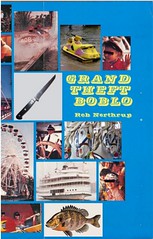Once again, Harper's demonstrates why it is the best fucking magazine going.
The Uses of Disaster by Rebecca Solnit
[These excerpts are from a postscript to the article posted on harpers.org Sep 8, 2005:]
...'We were told of “riots” and babies being murdered, of instances of cannibalism. And we were provided an image of authority, of control—of power as a necessary counter not to threats to human life but to unauthorized shopping, as though free TVs were the core of the crisis.'
...
'The Associated Press reports that last year “university researchers conducted an experiment in which police fired 700 blank rounds in a New Orleans neighborhood in a single afternoon. No one called to report the gunfire.”'
...
'The Convention Center and the Superdome became open prisons. “They won't let them walk out,” reported Fox News anchor Shepard Smith, in a radical departure from the script. “They got locked in there. And anyone who walks up out of that city now is turned around. You are not allowed to go to Gretna, Louisiana, from New Orleans, Louisiana. Over there, there's hope. Over there, there's electricity. Over there, there is food and water. But you cannot go from here to there. The government will not allow you to do it. It's a fact.” Jesse Jackson compared the Superdome to the hull of a slave ship. People were turned back at the Gretna bridge by armed authorities, men who fired warning shots over the growing crowd. Men in control. Lorrie Beth Slonsky and Larry Bradshaw, paramedics in New Orleans for a conference, wrote in an email report (now posted at CounterPunch) that they saw hundreds of stranded tourists thus turned back. “All day long, we saw other families, individuals and groups make the same trip up the incline in an attempt to cross the bridge, only to be turned away. Some chased away with gunfire, others simply told no, others to be verbally berated and humiliated. Thousands of New Orleaners were prevented and prohibited from self-evacuating the city on foot.” That was not anarchy, nor was it civil society.'...
The Uses of Disaster by Rebecca Solnit
[These excerpts are from a postscript to the article posted on harpers.org Sep 8, 2005:]
...'We were told of “riots” and babies being murdered, of instances of cannibalism. And we were provided an image of authority, of control—of power as a necessary counter not to threats to human life but to unauthorized shopping, as though free TVs were the core of the crisis.'
...
'The Associated Press reports that last year “university researchers conducted an experiment in which police fired 700 blank rounds in a New Orleans neighborhood in a single afternoon. No one called to report the gunfire.”'
...
'The Convention Center and the Superdome became open prisons. “They won't let them walk out,” reported Fox News anchor Shepard Smith, in a radical departure from the script. “They got locked in there. And anyone who walks up out of that city now is turned around. You are not allowed to go to Gretna, Louisiana, from New Orleans, Louisiana. Over there, there's hope. Over there, there's electricity. Over there, there is food and water. But you cannot go from here to there. The government will not allow you to do it. It's a fact.” Jesse Jackson compared the Superdome to the hull of a slave ship. People were turned back at the Gretna bridge by armed authorities, men who fired warning shots over the growing crowd. Men in control. Lorrie Beth Slonsky and Larry Bradshaw, paramedics in New Orleans for a conference, wrote in an email report (now posted at CounterPunch) that they saw hundreds of stranded tourists thus turned back. “All day long, we saw other families, individuals and groups make the same trip up the incline in an attempt to cross the bridge, only to be turned away. Some chased away with gunfire, others simply told no, others to be verbally berated and humiliated. Thousands of New Orleaners were prevented and prohibited from self-evacuating the city on foot.” That was not anarchy, nor was it civil society.'...







0 Comments:
Post a Comment
Subscribe to Post Comments [Atom]
<< Home